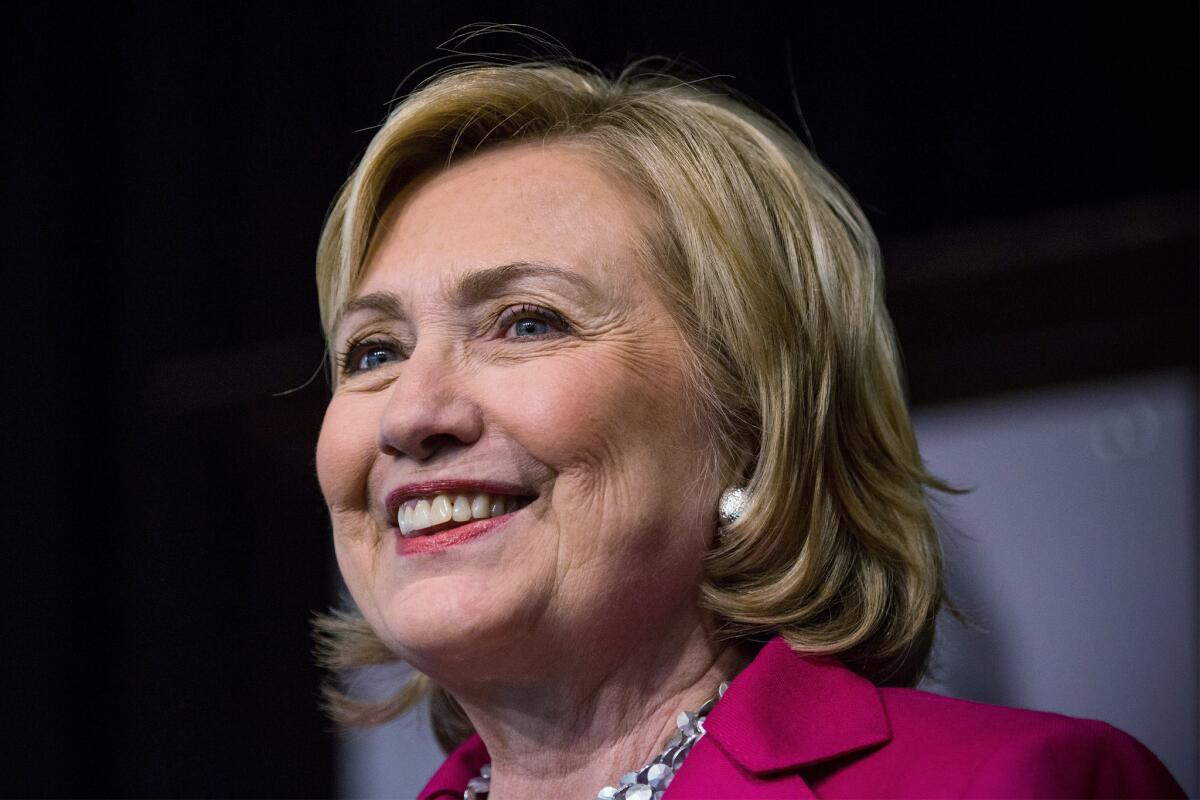Column: Hillary Clinton: She’s no Obama

- Share via
Hillary Rodham Clinton wants you to know that when it comes to foreign policy, she’s one tough lady. Tougher, say, than President Obama.
Most of Clinton’s 656-page memoir of her tenure as secretary of State, “Hard Choices,” is pretty much what you’d expect: a sober narrative of her four years wrestling with global problems, a spirited defense of decisions she made, plus a sprinkling of humanizing anecdotes — like the time Obama drew her away from a summit meeting to whisper, “You’ve got something in your teeth.”
But there’s also a recurring theme that runs through the story, and it’s this: She has not marched lock-step with the president and has frequently taken a more hawkish position than Obama’s.
And in Clinton’s telling, she almost always turned out to be right.
A few examples:
In Syria, Clinton and others urged Obama to send military aid to rebels fighting the repressive regime of Bashar Assad in 2012, but the president refused. “My position didn’t prevail,” she writes stoically. A year later, he changed his mind, and aid is now flowing.
In Afghanistan, Clinton thought Obama’s 2009 decision to set a public deadline for withdrawing U.S. troops was a mistake. “I worried that it might send the wrong signal to friend and foe alike,” she writes. Obama has stuck to his timetable on that one; Clinton doesn’t say it explicitly, but the tone suggests she still thinks he’s wrong.
In Egypt, Clinton thought the U.S. should try to slow down President Hosni Mubarak’s exit in 2011, not speed it up. But “like many other young people around the world, some of President Obama’s aides in the White House were swept up in the drama and idealism of the moment,” she writes a little acidly. “Those of us who favored the stodgy-sounding orderly transition position were concerned that the only organized forces after Mubarak were the Muslim Brotherhood and the military.” Another score for Clinton.
In Israel, Clinton warned in 2009 that a public demand by Obama for a freeze on Jewish settlements in the occupied West Bank would be counterproductive; Obama overruled her. The result? A confrontation with Israel and deadlocked negotiations.
And in Russia, Clinton warned in 2013 that President Vladimir Putin was becoming a problem, and urged Obama not to agree to a summit meeting with the Russian. Obama ignored her advice — and ended up canceling the meeting after Putin sheltered NSA leaker Edward Snowden.
That isn’t to say Clinton disagreed with most of Obama’s big decisions; far from it. She frequently praises the president she served, including his tough call to launch the 2011 raid that killed Osama bin Laden. Vice President Joe Biden was on the other side on that one, she notes. And she makes clear that she still supports Obama’s main foreign policy tenets.
But connect the dots and the message is clear: A Clinton presidency would have been more consistent in standing by U.S. allies, tougher on U.S. adversaries and readier to consider the use of military force (though she does say her Senate vote in favor of invading Iraq in 2002 was a mistake).
Clinton’s book isn’t the first time she’s distanced herself from Obama’s record. She also did so in an economic speech last month, in which she contrasted growing economic inequality “since 2000” with the better days that came before — when the president of the United States was named Clinton.
Taken together, the two statements clear up the mystery of how Clinton will separate herself from Obama’s legacy if she runs for president: She’s already done it. She’ll run to his left on economic policy — and to his right on foreign policy.
Democrats on the left wing of the party will probably remain skeptical.
“For progressives, the biggest thing about Hillary is a question mark,” said Charles Chamberlain, executive director of Democracy for America, the political organization founded by 2004 antiwar candidate Howard Dean. “She doesn’t have a great track record as far as we’re concerned. She’s been very, very close to Wall Street. And there’s a lot of concern that she’s too quick to support the military option.”
But with the U.S. military role in Afghanistan winding down, foreign policy isn’t the hot-button issue it was in 2008, when Obama won the nomination partly by winning the hearts of the antiwar left. So in 2016, as long as we aren’t facing another war scare, the presidential campaign could produce an unusual event: a Democratic Party that’s not fighting over foreign policy. That would make life much easier, if she runs, for Hillary Clinton.
More to Read
A cure for the common opinion
Get thought-provoking perspectives with our weekly newsletter.
You may occasionally receive promotional content from the Los Angeles Times.










